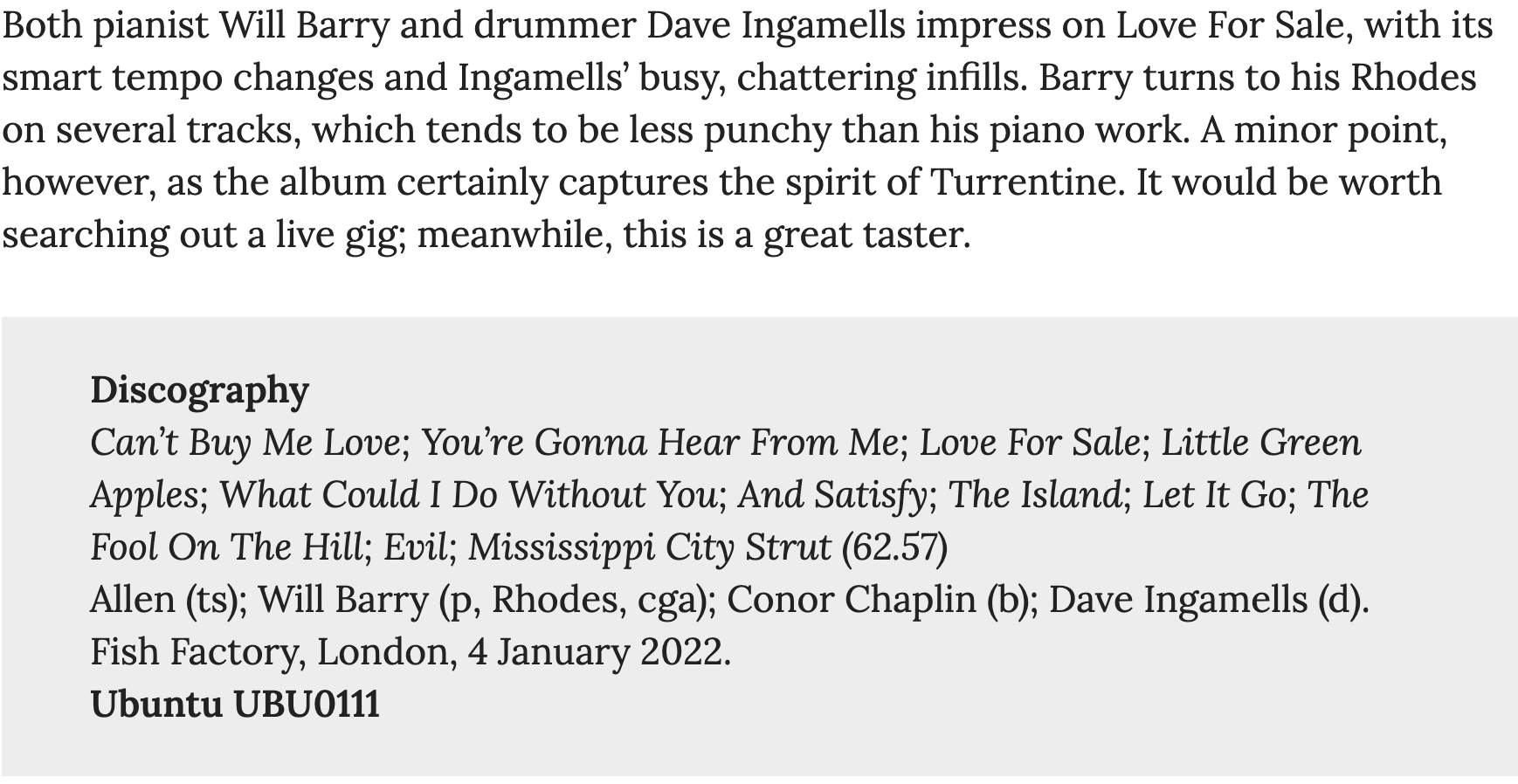New York City Jazz Record’s Alex henderson writes, “The result is a satisfying, if slightly derivative, effort that celebrates Turrentine’s legacy while letting Allen’s own personality come through.”
REVIEW: Brandon Allen
REVIEW: Brandon Allen
REVIEW: Brandon Allen
Brandon Allan – Stanley Turrentine Project, Bristol Beacon, Friday 11th March
Brandon Allen - The Stanley Turrentine Project
Germany’s jazz Halo gives a big thumbs up for the album!
Born in Perth, Western Australia and now based in the UK, saxophonist Brandon Allen has a special fondness for Stanley Turrentine's playing style and approach.
This is also reflected in the quote below about the current album: “This is very much a labor of love. My deep respect for Stanley Turrentine's music has guided me in putting together these arrangements and in my selection of what I believe is my strongest band to date. I believe that we've captured some of the 'spirit' of the music and I can't wait to share this album with the world." And what applies to Stanley Turrentine - "There's so many ways you can hit one note" - also applies to Allen, who comes very close to the flow of Turrentine without delivering a slavish copy of Turrentine. And another quote should be added at this point: "Like Ammons, I have always loved Stanley's way of phrasing and his unmistakable sound. Turrentine made his name performing with legends such as Jimmy Smith, Freddie Hubbard, George Benson and numerous others. His albums on the Blue Note and CTI labels in particular have become jazz classics. His soulful, expressive, and fluid style has always appealed to me. When putting this project together I deliberated over the choice of tunes for some time. Listening to as many albums as I could, discovering some gems along the way, I slowly began to pick out some selections that resonated with me and that would work well with this line-up. I then began to arrange these for the quartet. Some of the original versions were orchestral in nature and so I tried to capture the essence of that large ensemble feeling.” By the way, some listeners might describe the album as “mainstream”. For others, it's an album that harkens back to jazz's many roots. The current album also satisfies the fact that jazz is not a monolithic genre, but comes in a variety of forms.
Allen's quartet includes tenor saxophonist Allen, pianist and keyboardist Will Barry, bassist Conor Chaplin and drummer Dave Ingamells. No, we don't hear Allen's own compositions on the album. Instead, it opens with a Beatles song called "You Can Buy Me Love." With "The Fool On The Hill" the quartet recorded another Beatles song for the album. We also find on it "Love For Sale" (C. Porter), "Little Green Apples" (B. Russell) and a number of compositions by Stanley Turrentine, including "Mississippi City Strut" - the album's final track, "Let It Go" or "And Satisfy". By the way, if you're looking for a comparison with Stanley Turrentine's original playing style, listen to recordings like "Sugar" on YouTube. Everyone else just gets involved with Brandon Allen and prick up their ears.
"Can't Buy Me Love" is opened by the pianist of the quartet before Brandon Allen swings the musical scepter. But then it is again the pianist who puts his stamp on the piece with a style that is also characteristic of ragtime, phrasing and paraphrasing passages of the Beatles song. The tempo of the piece is brisk and may be ideal for jive dancing. In the opening piece, Brandon Allen emphasizes that a tenor saxophonist is able to play softly drawn, but also sonorous and, as it were, to combine the sounds like in a pearl game. Incidentally, anyone who remembers the hour of birth of rock'n'roll and early songs from this era in the 1950s will be able to discover sound affinities in Allen's playing. Incidentally, the arrangement with the interplay between the pianist and the saxophonist can also be found in "You're Gonna Hear From Me". "Love For Sale" is one of the jazz standards and dates back to 1930. The song comes from a musical. The song was written from the point of view of a hooker singing about the different ways of love. Initially a Cole Porter hit, "Love For Sale" fell victim to censorship and stopped being played by the radio stations. Lines like "Appetizing young love for sale/Love that's fresh and still unspoiled/Love that's only slightly soiled/Love for sale" could be heard. Brandon Allen presents a purely instrumental version on his album with him as the "leading voice" for the theme of the piece and the pianist with energetic accompaniment and fast-moving passages in the solo intermezzo. One is inclined to choose the term cascading. Allen picks up these cascades as soon as he is in focus again. Here and there he lets his saxophone voice be heard as a broken one. Yes, and then the bass player is also present as a soloist and not just as an accessory to a quartet. But he also foregoes the subject and instead indulges in string debauchery. The theme is heard at the end of the piece, however, when Allen chants it loudly on his woodwind. With "Little Green Apples" the presence of a Rhodes adds a very unique sound coloration. In addition, Allen lets his thoroughly sonorous voice ring out, only partially roughened and in no way exuberant. One gets the impression that this piece is also a piece of pop music. There is also a spicy pinch of soul to experience.
Let us now turn to Turrentine's compositions, which Allen selected and arranged for the album. First off, there's “And Satisfy”: a ragtime/boogie line is unmistakable on this track, especially in the sequences on the white and black keys that Will Barry taps. "Cascade Staircase" is appended to "Cascade Staircase". The saxophonist Allen lets his woodwinds “roar” over these piano passages. With less verve than Allen, bassist Conor Chaplin swings his woofer's strings for a long time as he introduces the song's theme. And in the course of the piece you see couples turning, the rollover and the quick sequence of steps that were common in Lindy Hop and later in Rock 'n' Roll. The sonorous, strongly fading saxophone passages in "Let It Go" stay in your head. In terms of style, the arrangement of this Turrentine composition hardly differs from "And Satisfy". But there is one difference: the saxophonist sometimes lets his instrument appear in a very blatant manner. However, since Allen's arrangements always leave room for his fellow musicians, this impression is not as overwhelming as with many other saxophonists, who in fact see themselves more as a solo entertainer in their performance. Finally, we would like to point out “Mississippi City Strut”: Not for the first time on the album, Will Barry grabs the keys of a Rhodes and breathes a bit of jazz rock into the piece, walking, one might think, on Joe Zawinul's paths. Overall, this instrumentation gives the piece a fresh cell treatment and also leaves Turrentine behind - and that's not the worst thing you can do.
Closing note: Wouldn't you like to know why the selection came down to the Beatles songs that we hear on the album? And that's not "Yesterday", not "When I'm 64" or "Norwegian Wood". Rights issues or a question of Turrentine-style arrangements for a quartet? Similarly, the question of choosing the Turrentine songs also arises, right?
Brandon Allen's release hits the US!
The Stanley Turrentine Project climbs up the Jazziz Magazine charts!
PREVIEW: Brandon Allen/The Stanley Turrentine Project
PREVIEW: Brandon Allen/The Stanley Turrentine Project
Ubuntu Music Signs Sax Man Brandon Allen For Album Release
Brandon Allen / The Stanley Turrentine Project
11th March 2022
CD & Digital Formats / UBU0111
Brandon Allen & Stanley Turrentine (Photographers: Patrick Holland + Francis Wolff)
Ubuntu Music is delighted to announce the signing of the exceptionally gifted saxophonist, Brandon Allen, for the release of his quartet album, The Stanley Turrentine Project, on 4th March 2022.
Brandon has established himself as one of the UK’s most in-demand saxophonists and bandleaders. He has performed extensively throughout the UK, Europe, the Middle East, Asia and Australia, both as a leader and sideman. Throughout his career he has worked with top international artists including Eric Clapton, Paloma Faith, Kyle Eastwood, Tony Lakatos, Adam Nussbaum, Gary Husband, Stefano Di Battista, US3, The Blockheads and many others.
Brandon Allen (Goat Noise Photography)
The Stanley Turrentine Project came about because of a deep admiration and respect for the late, great saxophonist’s musical approach and output. Brandon’s highly acclaimed Gene Ammons Project came into existence for the same reasons. Selections from Ammons’ entire catalogue were reinterpreted, seeking to capture the spirit of the music as well as exploring the stylistic changes that occurred throughout the tenor saxophonist’s 30-year career.
The repertoire of The Stanley Turrentine Project is slightly more specific, drawing from Turrentine’s releases on the Blue Note and CTI labels. In addition, some of Turrentine’s renditions of rock & pop hits of the 60s and 70s have been reimagined by Brandon and the quartet. Brandon explains:
“When putting this project together I deliberated over the choice of tunes for some time. Listening to as many albums as I could, discovering some gems along the way, I slowly began to pick out some selections that resonated with me and that would work well with this line-up. I then began to arrange them for the quartet.
“Some of the original versions were orchestral in nature and so I tried to capture the essence of that large ensemble feeling. With the other tracks I have taken all the main elements of the song but have made some small alterations, textural changes here and there and opened up certain sections for solos.”
Left to right: Will Barry, Conor Chaplin, Dave Ingamells (Goat Noise Photography)
"His (Brandon’s) four-octave range and flawless command of the altissimo register was nicely offset by his full-bodied yet raucous tonal quality offering something for fans of the entire history of the instrument- from Hawkins to Brecker- he's got ‘em covered."
--London Jazz News
Brandon shares his thoughts on the project, “This is very much a labour of love. My deep respect for Stanley Turrentine’s music has guided me in putting together these arrangements and in my selection of what I believe is my strongest band to date. I believe that we’ve captured some of the ‘spirit’ of the music and I can’t wait to share this album with the world.”
For his band, Brandon carefully selected some of London’s finest to join him on the project, including Will Barry (piano & keys), Conor Chaplin (acoustic & electric bases) And Dave Ingamells (drums).
Left to right: Conor Chaplin, Brandon Allen, Will Barry, Dave Ingamells (Goat Noise Photography)
Regarding his relationship with Ubuntu Music, Brandon elaborates further, “Releasing the Stanley Turrentine Project on Ubuntu is something that has been a long time coming. I have known Martin Hummel for quite some time, and he has always been a strong supporter of my music. Martin is a huge Turrentine fan and so when I mentioned to him about putting this album idea together he was extremely enthusiastic about the prospect. After working on QCBA’s ‘Beauty and Quiet Places’ and OMAR + QCBA’s ‘Live at Last’ together, it was about time that I embarked on a solo project with Martin and the great Ubuntu Music Label. I look forward to this album coming to fruition and I look forward to many more collaborations in the future.”
Martin Hummel, Director of Ubuntu Music, shares his thoughts: “Brandon is a genuine friend and the real deal, whom I’ve admired for a considerable period of time. And for good reason…he’s undisputedly one of the best in his trade, and his tone is off the charts. The Stanley Turrentine opportunity was a no-brainer. As we are serious, mutual admirers of the man, this release was simply destined to happen. We welcome Brandon with open arms, yet again, to the Ubuntu Music family, and can’t wait to share the project across the planet.”
For further information, please contact:
Brandon Allen (Artist) bdajazz77@hotmail.com
Martin Hummel/Ubuntu Music (Worldwide): martin@ubuntumanagementgroup.com





























